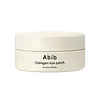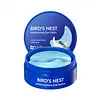What's inside
What's inside
 Key Ingredients
Key Ingredients

 Benefits
Benefits

 Concerns
Concerns

 Ingredients Side-by-side
Ingredients Side-by-side

Water
Skin ConditioningGlycerin
HumectantNiacinamide
SmoothingChondrus Crispus Powder
AbrasiveCollagen Extract
Skin Conditioning1,2-Hexanediol
Skin ConditioningBetaine
HumectantCeratonia Siliqua Gum
EmollientCyamopsis Tetragonoloba Gum
Emulsion StabilisingHydroxyacetophenone
AntioxidantChondrus Crispus
MaskingCalcium Chloride
AstringentAllantoin
Skin ConditioningButyrospermum Parkii Butter
Skin ConditioningPropanediol
SolventPolyglyceryl-10 Laurate
Skin ConditioningPolyglyceryl-3 Methylglucose Distearate
EmulsifyingPotassium Chloride
Anastatica Hierochuntica Extract
AstringentCellulose Gum
Emulsion StabilisingRicinus Communis Seed Oil
MaskingTrehalose
HumectantSucrose
HumectantCaprylyl Glycol
EmollientAdenosine
Skin ConditioningEthylhexylglycerin
Skin ConditioningDipotassium Glycyrrhizate
HumectantSodium Hyaluronate
HumectantCaffeine
Skin ConditioningPanthenol
Skin ConditioningCeramide NP
Skin ConditioningPalmitoyl Tripeptide-5
Skin ConditioningWater, Glycerin, Niacinamide, Chondrus Crispus Powder, Collagen Extract, 1,2-Hexanediol, Betaine, Ceratonia Siliqua Gum, Cyamopsis Tetragonoloba Gum, Hydroxyacetophenone, Chondrus Crispus, Calcium Chloride, Allantoin, Butyrospermum Parkii Butter, Propanediol, Polyglyceryl-10 Laurate, Polyglyceryl-3 Methylglucose Distearate, Potassium Chloride, Anastatica Hierochuntica Extract, Cellulose Gum, Ricinus Communis Seed Oil, Trehalose, Sucrose, Caprylyl Glycol, Adenosine, Ethylhexylglycerin, Dipotassium Glycyrrhizate, Sodium Hyaluronate, Caffeine, Panthenol, Ceramide NP, Palmitoyl Tripeptide-5
Water
Skin ConditioningGlycerin
HumectantCalcium Chloride
AstringentCeratonia Siliqua Gum
EmollientXanthan Gum
EmulsifyingSwiftlet Nest Extract
Skin ConditioningButylene Glycol
Humectant1,2-Hexanediol
Skin ConditioningPentylene Glycol
Skin ConditioningHydroxyacetophenone
AntioxidantChondrus Crispus Powder
AbrasiveScutellaria Baicalensis Root Extract
AstringentCamellia Sinensis Leaf Extract
AntimicrobialHouttuynia Cordata Extract
Skin ConditioningArtemisia Princeps Leaf Extract
Skin ConditioningCitrus Junos Fruit Extract
Skin ConditioningCaprylyl Glycol
EmollientAllantoin
Skin ConditioningPEG-60 Hydrogenated Castor Oil
EmulsifyingBetaine
HumectantPanthenol
Skin ConditioningEthylhexylglycerin
Skin ConditioningCalcium Titanium Borosilicate
AbrasiveMica
Cosmetic ColorantCI 77510
Cosmetic ColorantTin Oxide
AbrasiveCI 77891
Cosmetic ColorantRosa Centifolia Flower Water
Skin ConditioningChamaecyparis Obtusa Water
MaskingSodium Hyaluronate
HumectantAloe Barbadensis Leaf Extract
EmollientCucumis Sativus Fruit Extract
EmollientHydroxyethylcellulose
Emulsion StabilisingDisodium EDTA
Dipotassium Glycyrrhizate
HumectantParfum
MaskingSapphire Powder
Water, Glycerin, Calcium Chloride, Ceratonia Siliqua Gum, Xanthan Gum, Swiftlet Nest Extract, Butylene Glycol, 1,2-Hexanediol, Pentylene Glycol, Hydroxyacetophenone, Chondrus Crispus Powder, Scutellaria Baicalensis Root Extract, Camellia Sinensis Leaf Extract, Houttuynia Cordata Extract, Artemisia Princeps Leaf Extract, Citrus Junos Fruit Extract, Caprylyl Glycol, Allantoin, PEG-60 Hydrogenated Castor Oil, Betaine, Panthenol, Ethylhexylglycerin, Calcium Titanium Borosilicate, Mica, CI 77510, Tin Oxide, CI 77891, Rosa Centifolia Flower Water, Chamaecyparis Obtusa Water, Sodium Hyaluronate, Aloe Barbadensis Leaf Extract, Cucumis Sativus Fruit Extract, Hydroxyethylcellulose, Disodium EDTA, Dipotassium Glycyrrhizate, Parfum, Sapphire Powder
 Reviews
Reviews

Ingredients Explained
These ingredients are found in both products.
Ingredients higher up in an ingredient list are typically present in a larger amount.
1,2-Hexanediol is a synthetic liquid and another multi-functional powerhouse.
It is a:
- Humectant, drawing moisture into the skin
- Emollient, helping to soften skin
- Solvent, dispersing and stabilizing formulas
- Preservative booster, enhancing the antimicrobial activity of other preservatives
Allantoin is a soothing ingredient known for its protective and moisturizingg properties. Because of this, it is often added to products with strong active ingredients.
Studies show higher concentrations of this ingredient can promote wound healing.
Though it can be derived from the comfrey plant, allantoin is produced synthetically for cosmetic products to ensure purity.
Learn more about AllantoinBetaine is a common humectant (a substance that promotes retention of moisture). It's known to be gentle on the skin and can help balance hydration.
This ingredient is best for improving hydration and soothing irritated skin. Studies also show it helps even out skin tone.
Fun fact: Betaine is naturally created in the skin and body. The kind found within cosmetic products can be either plant-derived or synthetic.
Another name for betaine is trimethylglycine.
Learn more about BetaineCalcium chloride is a white, odorless, crystalline solid. It is an astringent and can be used to change the viscosity of products.
This ingredient is highly soluble in water, acetic acid, and ethanol.
There are many forms of this ingredient, including monohydrate, dihydrate, tetrahydrate, and hexahydrate.
Learn more about Calcium ChlorideCaprylyl Glycol is a humectant and emollient, meaning it attracts and preserves moisture.
It is a common ingredient in many products, especially those designed to hydrate skin. The primary benefits are retaining moisture, skin softening, and promoting a healthy skin barrier.
Though Caprylyl Glycol is an alcohol derived from fatty acids, it is not the kind that can dry out skin.
This ingredient is also used as a preservative to extend the life of products. It has slight antimicrobial properties.
Learn more about Caprylyl GlycolCeratonia Siliqua Gum is extracted from the seeds of the carob tree. You might know this ingredient as Carob Gum or Locust Bean Gum. It is used to stabilize other ingredients and improve the texture of products.
Carob gum is made up of long-chain polysaccharides. This makes it a natural thickener.
Yes! This ingredient comes from the seeds of a tree. The name 'Locust Bean Gum' can be misleading.
Learn more about Ceratonia Siliqua GumChondrus Crispus Powder is an exfoliant.
Dipotassium Glycyrrhizate comes from licorice root.
Extracts of licorice have demonstrated to have antibacterial, anti‐inflammatory, antiviral, antioxidant properties.
One component, glabridin, has extra potent antioxidant and soothing properties. It has also been found to block pigmentation from UVB rays in guinea pigs.
Licorice Root also contains a flavonoid. Flavonoids are a natural substance from in plants. Flavonoids also have antioxidant properties.
Another component, glycyrrhizin, has been found to have anti-inflammatory and antimicrobial benefits. This may make licorice root extract effective at treating acne. However, more research is needed to support this.
Liquiritin is one of the flavone compounds found in licorice. It has been found to help lighten skin by preventing tyrosinase from reacting with tyrosine. When the two react, protein is converted to melanin. Melanin is the substance in your body that gives your features pigmentation.
Licorice root is native to Southern Europe and Asia. It has been used in traditional Chinese medicine to help with respiratory issues.
Learn more about Dipotassium GlycyrrhizateEthylhexylglycerin (we can't pronounce this either) is commonly used as a preservative and skin softener. It is derived from glyceryl.
You might see Ethylhexylglycerin often paired with other preservatives such as phenoxyethanol. Ethylhexylglycerin has been found to increase the effectiveness of these other preservatives.
Glycerin is already naturally found in your skin. It helps moisturize and protect your skin.
A study from 2016 found glycerin to be more effective as a humectant than AHAs and hyaluronic acid.
As a humectant, it helps the skin stay hydrated by pulling moisture to your skin. The low molecular weight of glycerin allows it to pull moisture into the deeper layers of your skin.
Hydrated skin improves your skin barrier; Your skin barrier helps protect against irritants and bacteria.
Glycerin has also been found to have antimicrobial and antiviral properties. Due to these properties, glycerin is often used in wound and burn treatments.
In cosmetics, glycerin is usually derived from plants such as soybean or palm. However, it can also be sourced from animals, such as tallow or animal fat.
This ingredient is organic, colorless, odorless, and non-toxic.
Glycerin is the name for this ingredient in American English. British English uses Glycerol/Glycerine.
Learn more about GlycerinHydroxyacetophenone is antioxidant with skin conditioning and soothing properties. It also boosts the efficiency of preservatives.
This ingredient is not irritating or sensitizing.
Panthenol is a common ingredient that helps hydrate and soothe the skin. It is found naturally in our skin and hair.
There are two forms of panthenol: D and L.
D-panthenol is also known as dexpanthenol. Most cosmetics use dexpanthenol or a mixture of D and L-panthenol.
Panthenol is famous due to its ability to go deeper into the skin's layers. Using this ingredient has numerous pros (and no cons):
Like hyaluronic acid, panthenol is a humectant. Humectants are able to bind and hold large amounts of water to keep skin hydrated.
This ingredient works well for wound healing. It works by increasing tissue in the wound and helps close open wounds.
Once oxidized, panthenol converts to pantothenic acid. Panthothenic acid is found in all living cells.
This ingredient is also referred to as pro-vitamin B5.
Learn more about PanthenolSodium Hyaluronate is hyaluronic acid's salt form. It is commonly derived from the sodium salt of hyaluronic acid.
Like hyaluronic acid, it is great at holding water and acts as a humectant. This makes it a great skin hydrating ingredient.
Sodium Hyaluronate is naturally occurring in our bodies and is mostly found in eye fluid and joints.
These are some other common types of Hyaluronic Acid:
Learn more about Sodium HyaluronateWater. It's the most common cosmetic ingredient of all. You'll usually see it at the top of ingredient lists, meaning that it makes up the largest part of the product.
So why is it so popular? Water most often acts as a solvent - this means that it helps dissolve other ingredients into the formulation.
You'll also recognize water as that liquid we all need to stay alive. If you see this, drink a glass of water. Stay hydrated!
Learn more about Water